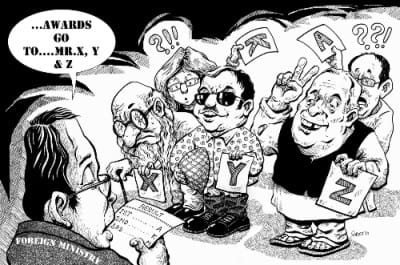Does the Foreign Office matter any more?

Photo: Sadat Uddin Ahmed Amil
IF it is true that henceforth it will be the Cabinet Division which will vet and approve all ambassadorial appointments, we have good reason to be alarmed. And that will be because it will mean that the Foreign Office has been stripped of its authority to choose the men and women it would like to represent the country abroad to the highest or most enlightened degree possible.
Worse, it will epitomise a Foreign Office that will no more be a sphere on its own but a department carrying out the orders of another, more powerful office which incidentally happens to be in the hands of the prime minister. And all this will amount to something of the bizarre in the conduct of Bangladesh's foreign policy abroad.
Before you move on, though, reflect on that small matter of a foreign policy. Do we have a foreign policy at all? Or does our poverty preclude any diplomatic thoughts we may have in our dealings with the world beyond our frontiers?
These are questions no one has answered, and not just in the brief period the Awami League government has been in office. Indeed, a growing proclivity on the part of those in the corridors of power appears to be to either ignore the Foreign Office altogether or simply to run it down.
As for the Foreign Office itself, it does not appear to promise anything of the vibrant and the suave where the question is one of Bangladesh's future diplomacy. The general feeling being that there has been a qualitative decline in the nation's diplomatic intake over the past many years, there is precious little we can look forward to in the times ahead. That little idea we have known as initiative, or call it intellectual drive, has been missing for a long time.
But, of course, to have an organisation operate on sheer energy you need equally enlightened and energetic leadership. The Foreign Office has not been privy to such leadership for a very long time. Hope flickered when Abul Hasan Chowdhury served the nation as minister of state for foreign affairs. But, then, the foreign minister at the time made sure that his deputy got nowhere. That was a tragedy.
Call it the bizarre. Call it tragedy. The Foreign Office has been going through it all. Superannuated military officers and partisan politicians have all been dumped into it, the better for these people to be sent abroad as ambassadors or high commissioners. Few, if any, of these men and women have convinced us that they have done any good for the country.
As a matter of fact, the scandalous has sometimes come about in the way Bengali diplomats, career foreign service officers or those imposed on Shegun Bagicha, have gone about their job. Not long ago, our newly appointed ambassador in Egypt and his deputy were recalled home, so the whispering ones say, for reasons that had everything to do with financial irregularities. No one has informed the country what went wrong or what measures are underway to take these men to task.
But, again, must we complain? Over the years, audit teams making a tour of Bangladesh's missions abroad have come away with dossiers prepared on everything that has been going wrong there. In how many instances have we observed action taken?
The Foreign Office, in a blunt manner of speaking, has been limping for a very long time. That ought not to have been the reality, given that there is a foreign service training academy whose job is to prepare young diplomats for service abroad. And yet there comes this rather cynical question; what will such training amount to if it is generally superannuated diplomats who are brought in on a contractual basis to man some of the more important missions abroad?
When a government ignores men and women in service and goes looking for those not in service any more to serve it, it simply dampens creative drive all across the diplomatic establishment. Examine the appointments this government has made since its assumption of office sixteen months ago. Can you honestly say that our ambassadors and high commissioners in the world's significant capitals have made any impact on the countries they are posted in?
And then observe the sheer predicament we get into when a serving ambassador, having been given the position of a minister of state, begins to describe himself as ambassador and minister of state. How can you be a minister of state and not be in the country? If you are a minister, how do you happen to be an ambassador? Is there no distinction between equivalence of position and actually being in that position? Will someone in authority, preferably the foreign minister, get us out of this conundrum?
The clear bottom line today is that Bangladesh needs to ratchet up its diplomacy around the world. That calls for a return of authority to the Foreign Office. It calls for a reshuffle in a good number of diplomatic missions. Men and women with a sense of global history, with a clear comprehension of national politics, with an ability to lock minds with minds around the world must be tapped in order for them to speak for Bangladesh abroad. It is a job a purposeful and activist foreign minister can do. It calls for someone in the mould of Kamal Hossain.

 For all latest news, follow The Daily Star's Google News channel.
For all latest news, follow The Daily Star's Google News channel. 



Comments